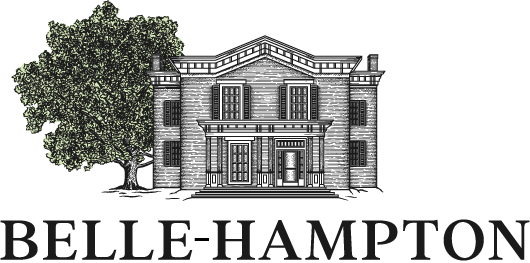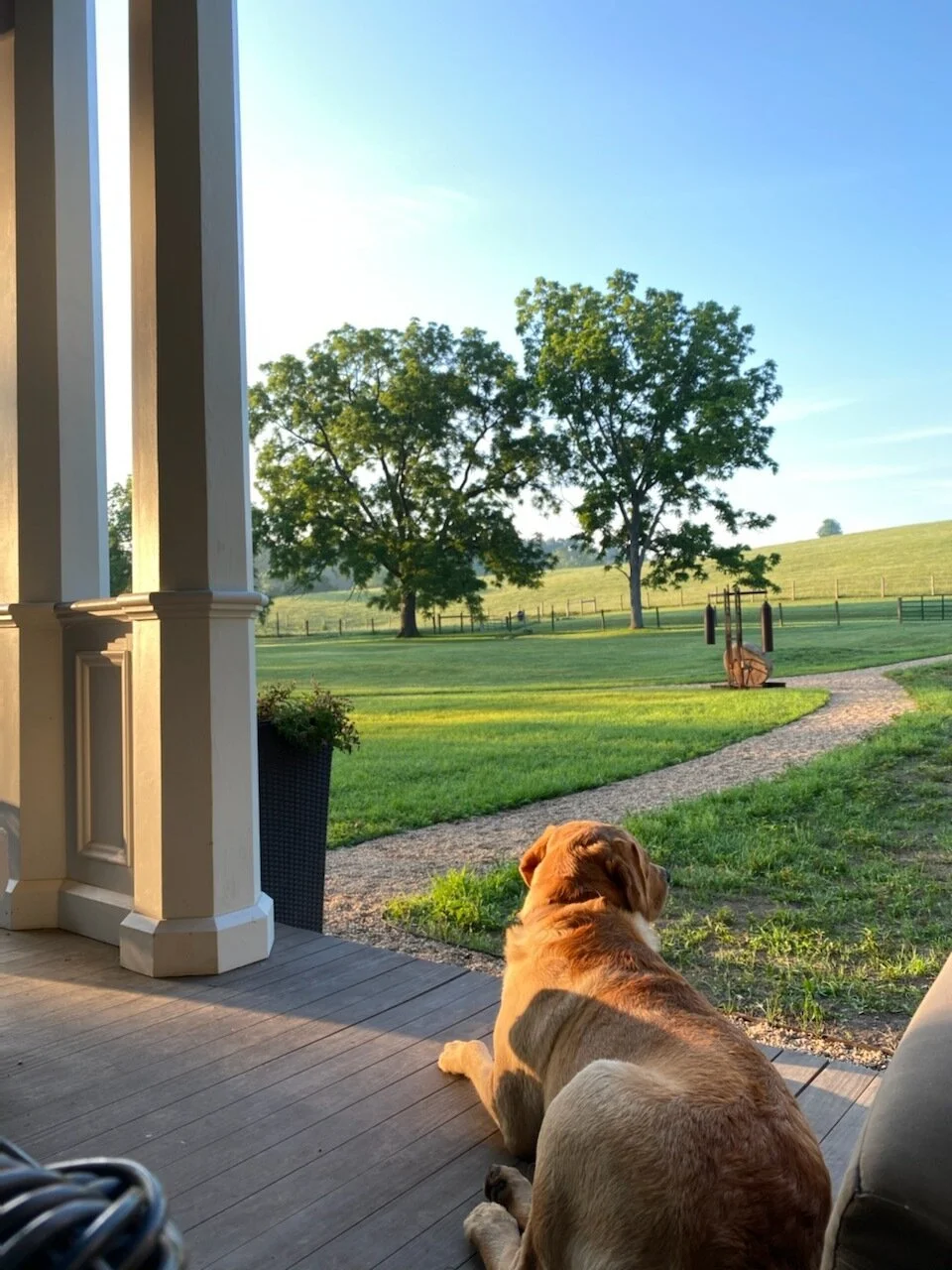Our Story on Living Intentionally
Branch on the front porch of the Main House
Growing up in Chicago I enjoyed the hustle and bustle of activity. The Sears Tower, Michigan Avenue and shopping at Marshal Fields were all part of my childhood. After meeting my husband in Atlanta, we bounced around the United States from NYC to Boston. We settled in a suburban town outside of Cincinnati to raise our children. An upper-class golf community where driving to the club via golf cart was the norm. I was selling luxury real estate in fancy dresses and heels, while my husband ran his engineering company donning his Robert Graham pressed shirts. We were living the dream.
Until the overwhelming life events that occurred in 2015, we thought we had the perfect life. My father in-law died in January. Then my mom suddenly died in April, just weeks before her two grandchildren, our boys, were graduating from college. On a tearful Mother’s Day, my mom’s favorite day, we watched our son receive his diploma. The next weekend, we watched our other son receive his engineering degree. He was the fourth generation to graduate from Virginia Tech, but his grandpa was now missing the heartfelt moment. Our son proudly wore his grandpa’s Virginia Tech’s class ring with the Hoge family crest for the occasion. The surge of raw emotions as we were surrounded by the university steeped in tradition, left us in tears.
As a family, we believe to live up to your full potential you needed to live intentionally. Annually, we would write down our goals and life priorities. But our list from 2014 did not seem to matter anymore. My husband no longer was interested in playing golf at the top 100 golf courses in the world. I no longer wanted to pursue top real estate agent status in my office. We seriously re-evaluated where we would want to live as well as how we would go about living.
After our 11 moves around the country over our married life, we looked for a place to establish our roots, to find our forever home. With our parents now gone and our boys on their own, we were at a crossroads in life. We could continue with our picture perfect setting or venture, intentionally, into something new, the unknown. What seemed almost illogical to most, we decided to buy a farm. Goodbye city life, we were embarking on new roles like the Green Acres saga.
This farm, however, was not just any farm. It was a historic property which has been in my husband’s family for seven generations, since 1767. At one time it was a flourishing business, but it had been dismantled over the years from neglect and family dis-function. 280 acres of pristine countryside along with deserted, boarded up structures were all that remained from the once 8,000-acre grand estate. A once thriving family business of farming, milling, black-smithing, coal mining and growing hemp, which was popular for making rope at the time, all gone. The desolate overgrown manor sat tucked away from the world in rural Southwest Virginia.
So, I traded my heels for muck boots. My husband’s pressed shirts and pants evolved to Carhartt attire. Instead of a golf cart, we drive a gator. Our closest neighbor is the next farm. Our well manicured and landscaped lawn was sacrificed for overgrown, untended rolling pastures. Our recently renovated two story house in the golf community was sold in exchange for abandoned unheated, un-electrified, animal infested structures. It about did me in when my husband fell through the floor of the barn followed by a snake falling out of the ceiling as we began our renovations. Although the road to our vision was not smooth, it was a labor of love.
As we learned about the property and family history, we began to realize the significance of Belle-Hampton for the community. The rumors about the structures being torn down were halted when they realized our goal for the future was to bring it back to prominence. We began crafting our legacy not for 5 or 10 years, but for the next 250 years. In order to do that, we needed the property to become a self-sustaining business at a minimum.
Utilizing 280 acres had a lot of options for an enterprise. We fantasized about developing a vineyard where we could produce a unique blend of wine with our own grapes. Although it sounded romantic, we had no idea the mix of delicate work and labor that was involved much less the chemistry of producing a good wine. After evaluating several possibilities and because the land historically produced prize cattle, we decided it was the best option. We couldn’t mow all of the rolling acres ourselves and the pastures had to be maintained, grass eating cows were a solution. Besides, it made sense to harvest meat with me being a vegetarian, right? But we wanted a distinctive venture, not ordinary beef. We explored types such as Charolais, Bison, and Beefalo, but we decided on another breed, Wagyu. This line is considered a Japanese national treasure, Kobe beef. Although we raise the full blood cattle through the same genetics, outside of Japan the breed is called Wagyu.
Subsequently visiting a nearby Virginia rancher, we took a leap of faith and bought some Wagyu cattle via artificial insemination. Not knowing anything about farming much less ranching, we realized that Google was a wonderful thing. In spring, our baby cows began to arrive, but they were tiny. Mom’s were having a hard time feeding them leaving us the responsibility of bottle or tube feeding them. Our success rate, however, was only fifty percent which definitely wasn’t profitable long term. The struggles of learning the ropes through studying the internet, attending conferences and relying on area farmers for advice, proved to be effective. Our next round of births were almost ninety percent healthy.
When people laughed at us for buying the farm being city raised and inexperienced, we told them to just wait until the Apocalypse hits and we will hunker down safely on the farm. Well, at the beginning of 2020 we couldn’t have scripted a better story. As the third structure, the Main House, was being completed, COVID19 hit the west coast. The week after move in day, the nation was shutting down. Virginia announced the “Safer at Home” order which speedily led to deliveries from panicked small business owners who still needed to deliver to our home or risk not getting paid. When the decree was implemented, we were hunkered down safely just as we had joked.
Serendipitous, we sent three of our Wagyu cattle to the processor for our first harvest. Little did we know that with the arrival of the pandemic, the stores would be out of toilet paper, sanitizer and meat. But our goal was to have our fine Back Creek Wagyu cuts in fine restaurants, not sold to the public. Frantically we developed a website and expeditiously started our online store. But shipping frozen food was a whole new learning curve. Fortunately google came through again and instantly we were in business.
But all of our structures also needed to be utilized to maintain their integrity long term. We already had our General’s Store out on AirBnb which got some traction in 2018 with Virginia Tech parents visiting their children, especially on football weekends. But with the virus, students were sent home and our reservations were being cancelled. We weren’t too concerned since our son utilized the quaint “store” to work and go to graduate school remotely. He escaped the city life for three months before he needed to get back to his own space to orchestrate a move. Magically as we re-opened the Airbnb, reservations flooded in. Not from Virginia Tech parents, but from couples living in NYC, Baltimore, Washington D.C. and other cities who have been confined to their tiny apartments now wanting to escape the chaos of living in a city raging with COVID19. They were appreciative of spending some time working remotely and relaxing in rural Virginia at a picturesque location.
Since we have leapt into our new life, we have told our story of living intentionally to other families and fellow business owners. After visiting our slice of heaven at Belle-Hampton, people have written to us stating it has changed their lives. With the process we have developed with another consulting company which includes Discovery, Dream and Design segments, we are now helping other family businesses and individuals build out their life strategy. Now that you have heard our story, what is yours and how can we help you build your vision and legacy?

